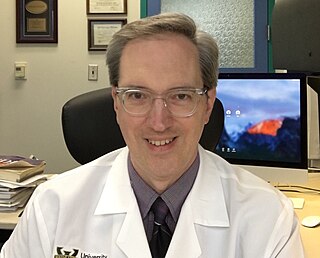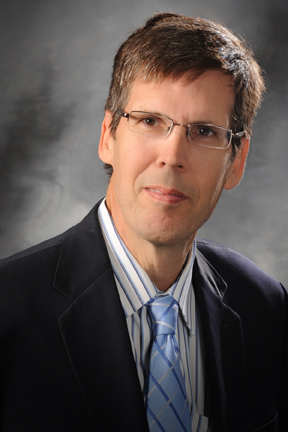Related Research Articles

Roswell Park Comprehensive Cancer Center is a cancer research and treatment center located in Buffalo, New York. Founded by surgeon Roswell Park in 1898, the center was the first in the United States to specifically focus on cancer research. The center is usually called Roswell Park in short. The center, which conducts clinical research on cancer as well as the development new drugs, provides advanced treatment for all forms of adult and pediatric cancer, and serves as a member of the National Comprehensive Cancer Network. Roswell Park Comprehensive Cancer Center is as of 2019, the only upstate New York facility to hold the National Cancer Institute designation of "comprehensive cancer center".
NCI-designated Cancer Centers are a group of 72 cancer research institutions in the United States supported by the National Cancer Institute.

Houston Lee Moffitt Cancer Center & Research Institute is a nonprofit cancer treatment and research center located in Tampa, Florida. Established in 1981 by the Florida Legislature, the hospital opened in October 1986 on the University of South Florida's campus. Moffitt is one of two National Cancer Institute-designated Comprehensive Cancer Centers based in Florida. In 2021, U.S. News & World Report ranked Moffitt Cancer Center as a top 30 cancer hospital in the United States.
Dartmouth Cancer Center (DCC) is a comprehensive cancer research center as designated by the National Cancer Institute. It is located at Dartmouth College and the Geisel School of Medicine in Hanover, New Hampshire. Its administrative offices are located within the Dartmouth-Hitchcock Medical Center in Lebanon, New Hampshire.
The Association of American Cancer Institutes (AACI) is a membership association of 106 academic and freestanding cancer research centers in the United States and Canada. AACI's membership roster consists of National Cancer Institute (NCI)-designated centers and academic-based cancer research programs that receive National Institute of Health (NIH) and NCI support.
The University of Maryland Marlene and Stewart Greenebaum Comprehensive Cancer Center (UMGCCC) is a National Cancer Institute (NCI)-designated comprehensive cancer center located in Baltimore, Maryland.
The Society for Immunotherapy of Cancer (SITC), previously known as the International Society for Biological Therapy of Cancer (iSBTc), is a professional society of scientists, academicians, researchers, clinicians, government representatives, and industry leaders from around the world dedicated to improving outcomes in patients with cancer by advancing the science and application of cancer immunotherapy. Currently, SITC has more than 2,400 members, representing 22 medical specialties from 42 countries around the world, who are engaged in the research and treatment of cancer.
Duke University Hospital is a 957-bed acute care facility and an academic tertiary care facility located in Durham, North Carolina. Established in 1930, it is the flagship teaching hospital for the Duke University Health System, a network of physicians and hospitals serving Durham County and Wake County, North Carolina, and surrounding areas, as well as one of three Level I referral centers for the Research Triangle of North Carolina. It is affiliated with the Duke University School of Medicine.

The Barbara Ann Karmanos Cancer Institute is a cancer research and provider network headquartered in Detroit, Michigan affiliated with the Wayne State University School of Medicine. The Karmanos Cancer Institute has 16 treatment locations and is one of 54 National Cancer Institute-designated comprehensive cancer treatment and research centers in the United States.

Charles L. Sawyers is a Howard Hughes Medical Institute (HHMI) investigator who holds the Marie-Josée and Henry R. Kravis Chair of the Human Oncology and Pathogenesis Program (HOPP) at Memorial Sloan Kettering Cancer Center (MSK). HOPP is a program created in 2006 that comprises researchers from many disciplines to bridge clinical and laboratory discoveries.
Professor Minesh P. Mehta, MD, FASTRO, is an American radiation oncologist and physician-scientist of Indian origin, Ugandan birth, Zambian Schooling and American Training, who contributed to the field of oncology for more than two and half decades.

David Henry Gorski is an American surgical oncologist and professor of surgery at Wayne State University School of Medicine. He specializes in breast cancer surgery at the Karmanos Cancer Institute. Gorski is an outspoken skeptic and critic of alternative medicine and the anti-vaccination movement. A prolific blogger, he writes as Orac at Respectful Insolence, and as himself at Science-Based Medicine where he is the managing editor.
Gibbs Cancer Center & Research Institute is a cancer treatment and research facility in Upstate South Carolina. Gibbs Cancer Center is associated with the NCI Community Cancer Centers Program and the Medical University of South Carolina. Gibbs has several locations across the upstate of South Carolina, including Comprehensive Cancer Centers at both Spartanburg Medical Center and Pelham Medical Center. Additional infusion facilities are located in Gaffney, Union, Mary Black and North Grove.
Ralph R. Weichselbaum is an American physician specializing in radiation oncology, a member of the Institute of Medicine of the National Academy of Sciences, Ludwig professor, He is Daniel K. Ludwig Distinguished Service Professor of Radiation Oncology and Chairman, Department of Radiation and Cellular Oncology, at the University of Chicago Pritzker School of Medicine, and Head of the University of Chicago Center for Radiation Therapy, and the director of the Chicago Tumor Institute. Weichselbaum is also Co- Director of the Ludwig Center for Metastasis Research at the University of Chicago.
John C. Ruckdeschel is an American oncologist who has written 160 peer reviewed articles.
Eric P. Winer is a medical oncologist and clinical researcher specializing in breast cancer. He is director of Yale Cancer Center and physician-in-chief of Smilow Cancer Hospital at Yale New Haven Health, effective February 1, 2022. He also is Deputy Dean for Cancer Programs at the Yale School of Medicine. From 1997 to 2021, he was the Chief of the Breast Oncology Program at Dana–Farber Cancer Institute in Boston, Massachusetts. Beginning in 2013, he held a range of institutional roles at Dana-Farber, including Chief of Clinical Development, the Thompson Chair in Breast Cancer Research and Director of the Dana-Farber/Harvard SPORE in Breast Cancer. He also served as a Professor of Medicine at Harvard Medical School. He was president of the American Society of Clinical Oncology (ASCO) 2022-2023 and became Chair of the Board in mid-June 2023. His career has been focused on breast cancer treatment and research.

Timothy Joseph Yeatman, M.D. F.A.C.S. is currently the Associate Center Director for Translational Research and Innovation for the Tampa General Hospital Cancer Institute and Professor of Surgery at the University of South Florida, United States. He previously served as the Executive Medical Director of Oncologic Services and the Senior Medical Director for the Oncology Clinical Program at Intermountain Healthcare, serving 23 hospitals and >6000 patients across the State of Utah and beyond. He was also Professor of Surgery at the University of Utah and a Member of the Huntsman Cancer Institute’s Cellular Response and Regulation Program. Dr Yeatman was also the Director of Gibbs Cancer Center and President of Gibbs Cancer Center & Research Institute in Spartanburg, South Carolinawhere he founded the Guardian Research Network, a novel approach to Clincial data analytics, leveraging the entire EHR for real time database queries for identifying clinical trial candidates. Yeatman held numerous positions at the Moffitt Cancer Center (MCC) in Florida over a 20 year span from 1992 - 2012. Yeatman served as the Associate Center Director for Clinical Investigations, the Associate Center Director for Translational Research, the Executive Vice President for Translational Research, Professor of Surgery and Cncologic Sciences, and the GI Tumor Program Leader at the Moffitt Cancer Center and the University of South Florida. There he led a $100m Moffitt:Merck collaboration and co-founded a novel biotech company, M2Gen. He also served as Chief Scientific Officer for the Center for Advancement of Science in Space (CASIS), a non-profit organization appointed by Congress and funded by NASA to oversee all scientific use of the International Space Station. He has been funded by the National Cancer Institute (NCI) since 1993 and continues to perform basic and translational colorectal cancer research in genomics and biomarker development.
David John Sugarbaker was an American physician who was chief of the division of general thoracic surgery and the director of the Baylor College of Medicine Lung Institute at CHI St. Luke's Health–Baylor St. Luke's Medical Center in Houston, Texas. He was an internationally recognized thoracic surgeon specializing in the treatment of mesothelioma, the surgical management of malignant pleural mesothelioma, and treatment of complex thoracic cancers.
Roy S. Herbst is an American oncologist who is the Ensign Professor of Medicine, Professor of Pharmacology, Chief of Medical Oncology, and Associate Director for Translational Research at Yale Cancer Center and Yale School of Medicine in New Haven, Connecticut.
Julie Renee Brahmer is an American thoracic oncologist. She is the Co-Director of the Upper Aerodigestive Department within the Bloomberg~Kimmel Institute for Cancer Immunotherapy at Johns Hopkins University and the Marilyn Meyerhoff Professor in Thoracic Oncology.
References
- 1 2 3 4 5 6 http://www.karmanos.org Retrieved 2017-03-23
- ↑ http://www.uni-marburg.de Retrieved 2010-80-11
- ↑ http://www.jimmyv.org Archived 2010-12-30 at the Wayback Machine Retrieved 2010-08-11
- ↑ http://www.moffitt.org Retrieved 2010-8-11
- ↑ home.med.wayne.edu.org Retrieved 2010-08-11